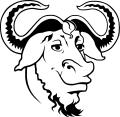| Ocrad | |
|---|---|
 | |
| Developer | Antonio Diaz Diaz |
| Stable release | |
| Repository | |
| Operating system | Linux, FreeBSD, NetBSD, OpenBSD, macOS |
| Type | Optical character recognition |
| License | 2014: GPL-2.0-or-later [a] 2007: GPL-3.0-or-later [b] 2003: GPL-2.0-or-later [c] |
| Website | gnu.org/s/ocrad |
Ocrad is an optical character recognition program and part of the GNU Project. It is free software licensed under the GNU GPL.
Contents
Based on a feature extraction method, it reads images in portable pixmap formats known as Portable anymap and produces text in byte (8-bit) or UTF-8 formats. Also included is a layout analyser, able to separate the columns or blocks of text normally found on printed pages.